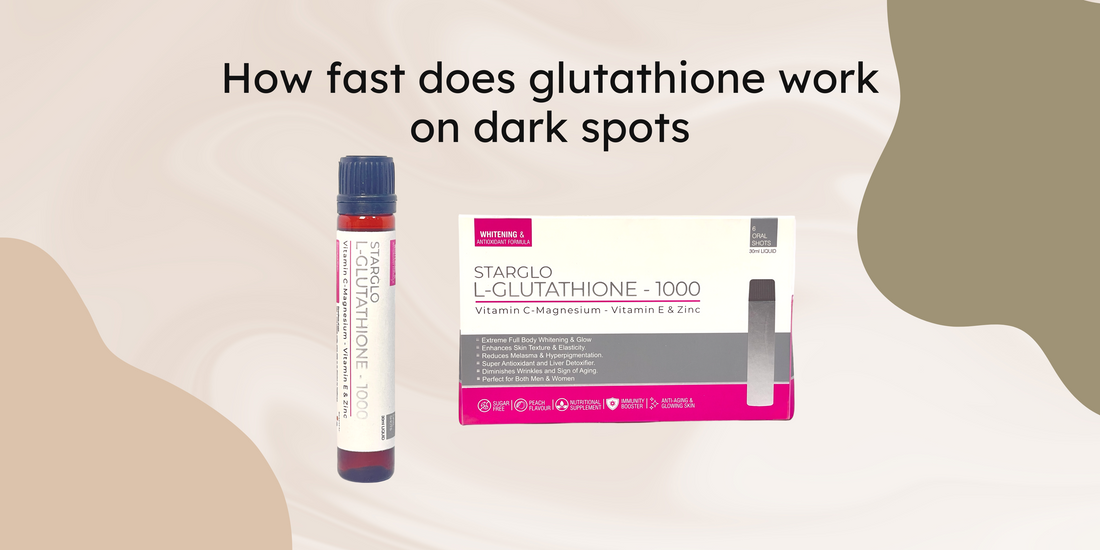
How fast does glutathione work on dark spots
Share
I've been getting this question a lot lately from friends who see my face looking clearer than it has in years. "How long did it take for those dark spots to fade?" they ask, pointing at areas where I used to have stubborn acne marks and sun damage from my college days.
The honest answer? It's complicated, and anyone promising you results in two weeks is probably trying to sell you something.
The Reality Check: My 3-Month Journey
Let me start with what actually happened when I began using glutathione for my dark spots, because the timeline matters more than people realize.
Month 1: Absolutely nothing visible. I was taking oral glutathione supplements daily and using a topical cream. My sister kept asking if I was wasting my money. I started questioning it too.
Month 2: This is when I noticed the first real change. The dark spots weren't lighter exactly, but my overall skin tone looked more even. The redness from old acne scars seemed less angry.
Month 3: Now we're talking. The spots on my cheeks that had been bothering me for two years were noticeably lighter. Not gone, but definitely improved enough that I could skip concealer on some days.
Month 4-6: Steady improvement. The deepest spots took the longest, but even those were fading gradually.
Why Glutathione Takes Time (The Science Part)
Here's what I learned from reading way too many research papers: glutathione works by inhibiting an enzyme called tyrosinase, which is responsible for melanin production. But it doesn't just bleach existing dark spots - it has to interrupt the process that creates new pigmentation while helping your skin naturally shed the old, damaged cells.
Think of it like this - your skin completely renews itself every 28 days or so. Glutathione needs several of these renewal cycles to show significant results. That's why dermatologists typically recommend giving it at least 8-12 weeks before deciding if it's working.
What Affects How Fast You'll See Results
Not everyone responds to glutathione at the same speed. After talking to my dermatologist and comparing notes with friends, here's what seems to make a difference:
Age of the dark spots: Fresh acne marks responded faster than sun damage I'd had for years.
Your natural skin tone: People with lighter skin often see changes sooner, while those with deeper skin tones might need longer but often get better overall results.
How you take it: Oral supplements plus topical treatment worked better for me than either alone.
Consistency: Skipping days definitely slowed down progress. This isn't something you can use occasionally.
Timeline Breakdown: What to Expect When
| Time Period | What You Might Notice | What's Actually Happening |
|---|---|---|
| Week 1-2 | Nothing visible | Glutathione building up in your system |
| Week 3-4 | Skin feels smoother | Cell turnover starting to improve |
| Month 2 | Overall tone looks brighter | Surface pigmentation beginning to fade |
| Month 3 | Dark spots starting to lighten | Deeper pigmentation responding |
| Month 4-6 | Significant improvement | Maximum results for most people |
| Month 6+ | Maintenance phase | Preventing new dark spots |
My Experience with Petalze Glutathione
Rating: 4/5 stars
I tried Petalze after my dermatologist recommended looking for a glutathione product with vitamin C and alpha lipoic acid, which help glutathione work better. Petalze has both in their formulation.
The results: I started seeing changes around week 10, which is pretty typical according to my research. My acne scars on both cheeks lightened significantly, and some smaller sun spots on my forehead almost completely disappeared.
What could be better: It's more expensive than some local brands, but honestly, the quality seems worth it. My only real complaint is that they don't sell individual bottles - you have to buy a 3-month supply, which is a bigger upfront investment.
Would I buy again? Yes, and I actually am. I'm on my second round now for maintenance and to work on some deeper spots that are still fading.
Important Link: When will i see results from glutathione
Things That Speed Up Results (From My Experience)
Sunscreen is non-negotiable: I learned this the hard way. Using glutathione while continuing to get sun damage is like trying to fill a bucket with holes in it.
Exfoliate gently: Once or twice a week with a mild exfoliant helps the faded pigment cells shed faster. Don't overdo this, though.
Vitamin C serum: Using this in the morning while taking glutathione at night seemed to boost results.
Stay hydrated: Sounds basic, but proper hydration helps your skin renew itself more efficiently.
When to Be Patient vs. When to Worry
Look, I get it. When you're dealing with dark spots that make you self-conscious, waiting months for results feels impossible. But here's when you should stick it out versus when you might need to change course:
Stick with it if:
- You're seeing gradual lightening, even if it's slow
- Your overall skin tone is improving
- You're being consistent with use and sun protection
Important Link: I Drank Peach Glutathione for 7 Days – Shocking Results!
Consider other options if:
- You've used it consistently for 4 months with zero change
- You're experiencing irritation or side effects
- You have very deep, old dark spots that might need professional treatment
Conclusion
Glutathione isn't a quick fix, and anyone telling you otherwise is setting you up for disappointment. But for stubborn dark spots that haven't responded to other treatments, it can be genuinely effective if you're patient enough.
My spots didn't disappear overnight, but six months later, I'm happier with my skin than I've been in years. The key is managing expectations and being consistent.
If you're considering trying glutathione, give yourself at least 3 months to see real results. Take photos to track progress because day-to-day changes are hard to notice. And please, please wear sunscreen - all the glutathione in the world won't help if you keep creating new damage.
Remember, clear skin is a marathon, not a sprint. But sometimes the slow and steady approach actually wins the race.
FAQs on Glutathione for Dark Spots
Q1: How long does it take for glutathione to fade dark spots?
On average, visible results appear after 8–12 weeks of consistent use, with deeper pigmentation often taking 4–6 months to fade.
Q2: Why doesn’t glutathione work immediately?
Because it works by slowing melanin production and supporting skin cell renewal, which takes multiple 28-day skin cycles.
Q3: Does glutathione lighten all types of dark spots?
Fresh acne marks usually respond faster than long-term sun damage, which requires more patience and consistent treatment.
Q4: Is topical glutathione enough, or should I combine it with supplements?
Using both oral supplements and topical creams tends to give better results than either one alone.
Q5: What can make glutathione work faster?
Daily sunscreen, gentle exfoliation, vitamin C serum, and proper hydration significantly boost results.
Q6: When should I stop using glutathione?
If you see no improvement after 4 months of consistent use or if you experience irritation or side effects, consult a dermatologist.


